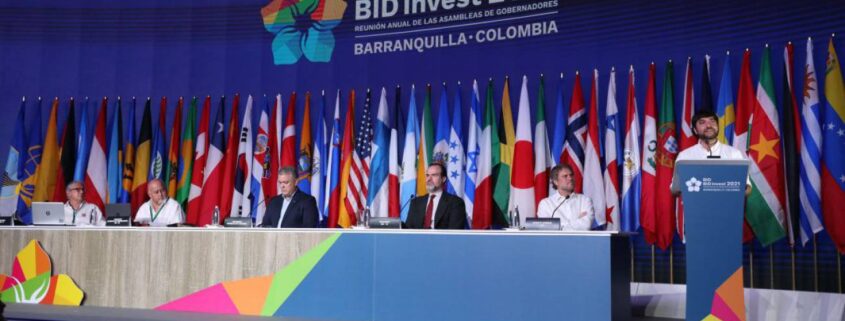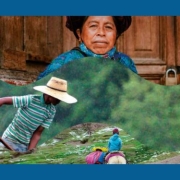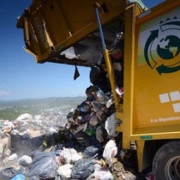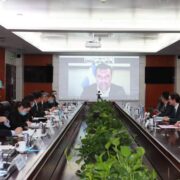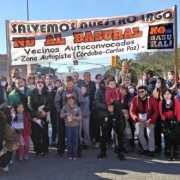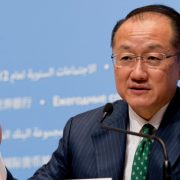The 2021 Annual Meeting of Governors of the IDB and IDB Invest was held
Between March 17 and 21, the Annual Meeting of Governors of the Inter-American Development Bank was held virtually. Different economic and financial leaders from member countries and the private sector discussed the pandemic and the economic recovery in Latin America and the Caribbean.
“Below, we offer a google translate version of the original article in Spanish. This translation may not be accurate but serves as a general presentation of the article. For more accurate information, please switch to the Spanish version of the website. In addition, feel free to directly contact in English the person mentioned at the bottom of this article with regards to this topic”
Each year, the IDB holds its Annual Meeting of the Board of Governors in one of the member countries. This year, the Assembly was held in the city of Barranquilla, Colombia, and its agenda was crossed by two central themes: the economic recovery of Latin America and the Caribbean in the face of the crisis caused by the pandemic, and the capitalization of the Bank.
First, the Bank’s president, Mauricio Claver-Carone, affirmed the IDB’s commitment to helping countries recover from the current economic crisis, reaffirming support for the financing needs of governments and assistance for access and negotiation in the purchase of vaccines. Based on this, Claver-Carone is committed to promoting the agenda that the Bank baptized as “Vision 2025”: reinvesting in the Americas, a decade of opportunities ”.
This agenda establishes five areas in which the IDB will focus in our region. These areas are: regional integration, strengthening value chains, supporting small and medium-sized enterprises, promoting the digital economy and prioritizing responses to gender and climate change issues.
On the other hand, Claver-Carone emphasized the work of the IDB Group during 2020, which in response to the COVID-19 emergency, approved loans for almost US $ 24,000 million, both to companies and governments, reaching record levels in the granting of loans. Faced with this, the president referred to the Bank’s capitalization: “I ask you to reinvest in us so that we can decisively reinvest in the region (…) The region will have a committed partner to help countries face these historical challenges and be well equipped with the financial resources necessary to make a big difference ”.
The Assembly then approved a resolution authorizing the work necessary to consider a potential capital increase of around US $ 80 billion. This amount was authorized by the United States Senate and was described by the Bank’s president as “the largest capitalization in its history.” Capitalization is a process that will increase the IDB’s creditworthiness and lending capacity. Through this, the Bank’s capital will be revalued and will allow it to face its need to address the financing problems of the region.
Finally, Claver-Carone referred to the need for the participation of women in the labor market to promote economic growth in Latin America and the Caribbean and made known new contributions for the Amazon region between Colombia and Brazil to promote development sustainable through an environmental approach.
Undoubtedly, this year’s Assembly leaves us with a clear forecast of what the IDB Group will do in our region, crossed by the needs generated by the pandemic, by a new Bank presidency and by new agendas to be implemented, supported by the new capitalization. In this sense, it is worth noting that this capitalization process should be accompanied by a series of necessary internal reforms at the institutional level, which effectively ensure greater transparency and protection of social and environmental rights in projects financed by the Bank or its clients. .
At the same time, the process of citizen participation and relationship with civil society should be strengthened. The way in which spaces such as the Board of Governors are structured and planned, for example, reflect the Bank’s little predisposition to create effective spaces for exchange and dialogue with civil society and affected communities. We hope that these are some of the points to be reviewed by the Bank in view of a possible capitalization.
More information
- IDB Annual Meeting will address economic recovery and sustainable growth – IDB
- Annual meeting of the Boards of Governors of the IDB and IDB Invest – IDB
- IDB and IDB Invest get support from the Assembly for Vision 2025 and route to capitalization – IDB
- Roadmap for IDB recapitalization approved – The New Century
Author
- Sofia Armando
Contact
- Gonzalo Roza, gon.roza@fundeps.org

